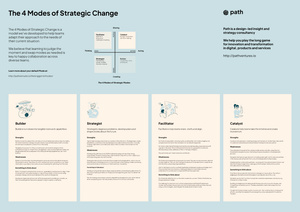Play the long game
We believe the long game is the shortest path to change. Playing the long game is about orienting your actions to your purpose through context.

What is the long game?
The long game is our shorthand for an approach to that aligns strategic purpose with a bias for action.
We believe that in doing the hard work to build strong foundations and consistently orient our actions to our evolving context.
Playing the long game unlocks a superpower that can move us steadily in the right direction at increasing velocity.

The keys to a strong long game

Orient action to purpose through context
Playing the long game doesn't mean slowly working towards a far-off goal, or planning everything upfront.
It means setting clear direction and building feedback and context-setting into our action cycles, to harness a bias for action to our strategic purpose.
10 Principles for playing the long game
Context

1. Know your ecosystem
Work from deep knowledge of your ecosystem and the players within it.

2. Front-load pattern building
Do the hard work of simplifying patterns and cross-cutting mechanics before you dive into the complexity of delivering to specific groups or business units. You'll never regret removing complexity or ambiguity upfront.

3. Sweat the detail
Be precise and rigorous about the details. Continuously clarify and evolve your knowledge to be mutually exclusive and comprehensively exhaustive.
Action

4. Make the system knowable
Use visualisations, mappings and models to make the system easier to understand as a whole and in parts. Be disciplined in sharing and evolving common models.

5. Anticipate the future
Actively plan and prepare for an unknowable future. Think in scenarios and probabilities rather than certainties.

6. Act in cycles
Act in cycles and loops that enable continuous feedback, contextualisation, decision-making and action. Build rhythms, capacities and organisational flexibility that maintain momentum without losing direction.

7. Take calculated risks
Use your knowledge and capabilities to take calculated risks on strategic bets. Act decisively when opportunities present themselves.
Purpose

8. Act as stewards
Think in longer cycles as a steward of your ecosystem, which includes your organisation and it's context. Consider the consequences of your actions for the future.

9. Build foundations
Develop new capabilities before you know how they will be used. Experiment with new ways of doing the fundamentals of your activity. Create the possibilities for Cambrian explosions.

10. Prepare for impossible shifts
Use your skills, resilience and foresight to embrace paradigm shifts and prepare for giant leaps.
What's your default mode of playing the long game?
We've identified 4 common ways that people can approach strategic change, each with strengths and weaknesses in different situations.
Our simple tool can help you discover your default mode and how to work with the rest.

